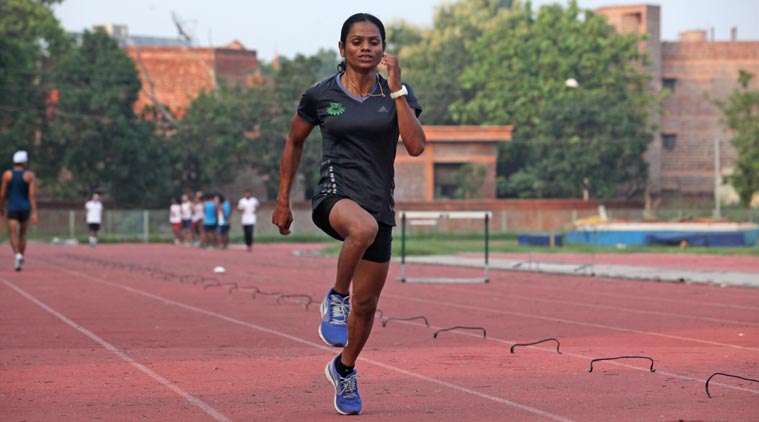Sprinter Dutee Chand wins right to compete
 Dutee Chand can now look forward to qualifying for Rio Olympics.
Dutee Chand can now look forward to qualifying for Rio Olympics.
Sprinter Dutee Chand, the daughter of a marginal weaver couple from Chaka Gopalpur village in Orissa, has forced the highest court in sport to take a landmark judgment that challenges gender guidelines set by the sporting world.
Dutee successfully knocked on the doors of the Lausanne-based Court of Arbitration for Sport (CAS) which declared void the international athletics body’s rules which debar athletes with hyperandrogenism — deemed excessive but naturally occurring testosterone — from competing in the female category.
On July 18 last year, the Athletics Federation of India had removed Dutee’s name from the team for the Commonwealth Games after she was tested for hyperandrogenism. However, instead of opting for therapy or surgery, Dutee, who said that she was always brought up as a girl, decided to challenge the IAAF regulations governing females with hyperandrogenism. On Monday, in a historic decision, the CAS suspended the IAAF’s regulations which make it ineligible for athletes with hyperandrogenism to compete in the female category and allowed Dutee to participate in national and international meets for a period of two years.
CAS has also put the onus on IAAF to provide scientific evidence that there’s a link between enhanced performance and testosterone in hyperandrogenic athletes.
“The Court of Arbitration for Sport (CAS) has issued an Interim Award in the arbitration procedure between the Indian athlete Dutee Chand, the Athletics Federation of India (AFI) and the International Association of Athletics Federations (IAAF),” the CAS statement issued on Monday stated.
“The CAS Panel in charge of the procedure (The Hon. Justice Annabelle Claire Bennett AO, Australia (President), Prof. Richard H. McLaren, Canada, and Dr Hans Nater, Switzerland) has suspended the “IAAF Regulation Governing Eligibility of Females with Hyperandrogenism to Compete in Women’s Competition” (the “Hyperandrogenism Regulations”) for a maximum period of two years in order to give the IAAF the opportunity to provide the CAS with scientific evidence about the quantitative relationship between enhanced testosterone levels and improved athletic performance in hyperandrogenic athletes. In the absence of such evidence, the CAS Panel was unable to conclude that hyperandrogenic female athletes may benefit from such a significant performance advantage that it is necessary to exclude them from competing in the female category,” the statement added.
The IAAF guidelines require females to have testosterone of less than 10 nanomoles per litre. On getting to know of the interim award from CAS, Dutee, who has been training in Gachibowli, Hyderabad, and is based at the Gopichand badminton academy, was overwhelmed by emotion and immediately called up her mother Akkaji Chand.
“My mother told me that no matter what people said, God was always with us. She is relieved and happy that I can continue to run. It was difficult to tell her initially why I was not allowed to run. Hearing the joy in my mother’s voice was a big relief,” Chand said.
The CAS interim award means Dutee can now aim to qualify for the Rio Olympics in 2016. The impact of the verdict is not exclusive to Dutee but will now allow similar athletes, who have been diagnosed with hyperandrogenism, to compete in the World Championships in August and the Olympic Games next year.
“While the Hyperandrogenism Regulations are suspended, Ms Dutee Chand is permitted to compete in both national and international level athletics events. Should the IAAF not file any scientific evidence within the two-year period granted by the CAS Panel, the Hyperandrogenism Regulations will be declared void,” the CAS statement added.
Dr Payoshni Mitra, a research consultant on gender and sports issues, who convinced Dutee to take her fight to CAS, said: “This verdict upholds the gender equality in sports. I am sure the IAAF and the AFI will welcome this decision.” She added: “When I went to see Dutee in her village on July 20 last year, little did we know we will get here in a year and a week. The support for Dutee in India and worldwide was unprecedented.”
The New York Times quoted Katrina Karkazis of the Center for Biomedical Ethics at Stanford University, who helped argue Chand’s case before CAS, saying: “I am shocked and heartened by CAS’s decision. I didn’t think it was our time. Dutee has made history with her courageous decision to challenge a policy she felt was unfair to her and to all women athletes. It’s a victory for women’s equality in sport. And I’m thrilled she can just now run.”
Dutee was allowed to compete in domestic competitions and also at Asian Athletics Championships in Wuhan after CAS, earlier this year, had granted her interim relief till the final verdict was pronounced.





